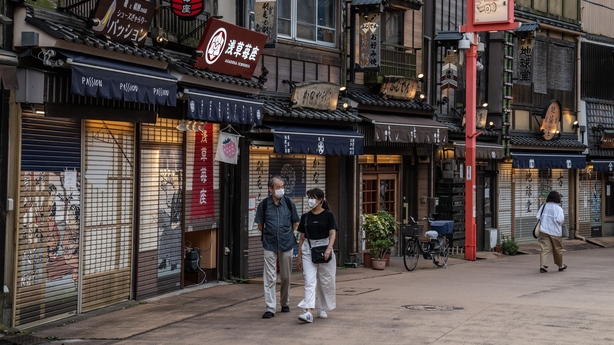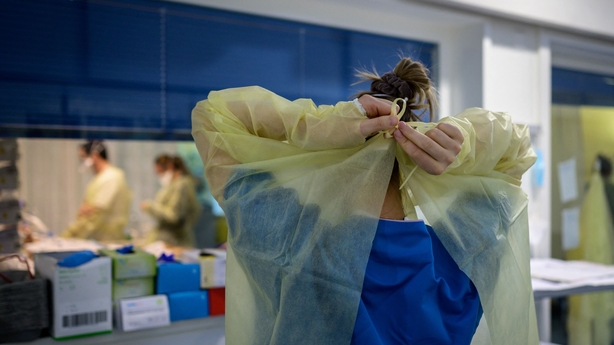China is battling coronavirus outbreaks in several cities, testing the country's strict 'zero-Covid' strategy just weeks before Beijing hosts the Winter Olympics.
Fears are growing about China's largest domestic Omicron cluster to date in the northern port city of Tianjin, where two confirmed cases of the highly transmissible variant were discovered over the weekend.
A local official said that the strain of virus identified had been transmitting for "at least three generations" - indicating weeks of earlier spread - with the source unclear.
Residents cannot leave the city without official permission, while an entire district and two nearby townships were locked down.
Buses and flights out of the city were cancelled yesterday, and schools and university campuses have been closed.
The historic city of Xi'an, which is home to 13 million people, is in its third week of a strict lockdown as it races to stamp out a 2,000-case outbreak, one of the largest in China for months.

Residents are not allowed to leave their homes or travel out of the city, famed for its Terracotta Warriors.
Local authorities have come under fire for their handling of a lockdown that has included supply issues and medical tragedies.
Several cities in the central province of Henan - which lies near Xi'an - have strengthened virus controls in response to hundreds of new infections since late December.
The province has reported 87 new local cases. It is not clear how many of these are Omicron cases.
Last week, one million people in Yuzhou city were put under stay-at-home orders.
Beijing last week sealed off its Winter Olympics "closed loop", which will cocoon thousands of athletes and Games staff for weeks without direct physical access to the outside world.
Anyone entering the bubble must be fully vaccinated or face a 21-day quarantine when they arrive. Everyone inside will be tested daily and must wear face masks at all times.
The city has barred entry to people travelling from places that have recorded Covid cases in the last two weeks and requires all arrivals to show a negative test from the past 48 hours.
Tokyo, Osaka record most Covid-19 cases in four months as Omicron spreads
Japan recorded a surge in new coronavirus cases today, with infections reaching four-month highs in the major metropolitan areas of Tokyo and Osaka as the Omicron variant spreads.
New cases totalled 2,198 in the capital of Tokyo, while the western prefecture of Osaka recorded 1,711, nearly tripling from the day before.
Those marked the highest levels since early September.

Covid-19 cases across Japan will exceed 10,000 today,according to a tally by broadcaster TBS. That tally would be the highest number of infections in Japan in a single day since 9 September.
"We must brace for the rapid spread of infections to continue," Chief Cabinet Secretary Hirokazu Matsuno told reporters, noting that the Omicron variant had been discovered in most regions of the country.
On Sunday, Japan stepped up coronavirus restrictions in three regions that host US military facilities, after it appeared that Omicron outbreaks at the bases spilled into the surrounding communities.
Prime Minister Fumio Kishida said yesterday that Japan will maintain strict border restrictions through February to slow the spread of Omicron.
Swiss halve quarantine period to five days to cope with Omicron surge
Switzerland will halve its quarantine time to five days to help cope with a wave of coronavirus infections that threatens to hamstring the economy,the government said today.
Health authorities had given their blessing yesterday for the move, which comes as tens of thousands more people get infected every day due to the highly transmissible Omicron variant of the virus.
Officials worry that the wave could overwhelm the healthcare system in a country where only two-thirds of the population has got two jabs and just 30% has had a booster shot.

The government also proposed extending until the end of March curbs on public life it tightened last month while trying to avoid another lockdown and making vaccinations mandatory, as neighbouring Austria is doing.
"The epidemiological situation is critical and remains difficult to assess," the government said in a statement.
The government said although the Omicron variant seemed to be less dangerous, it expected an increase in hospitalisations due to the very high number of infections, which rose to 32,881 new cases today.
The reduction in the quarantine requirement will go into effect from tomorrow. This could be done because the Omicron variant had a shortened time between infection and transmission to other people, the government said.
Measures introduced in December included the need for people to prove they have been vaccinated or recovered from Covid-19 to gain entry to many indoor venues, as well as making work from home mandatory.
National authorities have reported more than 1.6 million confirmed infections on Switzerland and tiny neighbour Liechtenstein since the pandemic broke out in early 2020. More than 12,000 have died of the respiratory ailment.
The eastern canton of the Grisons ordered all residents with nursing training to register in case they are needed to relieve pressure on hospitals.
"It can be assumed that the sharp increase in coronavirus cases will push medical care, or rather the human resources in the nursing professions, to their limits," the regional government said.

